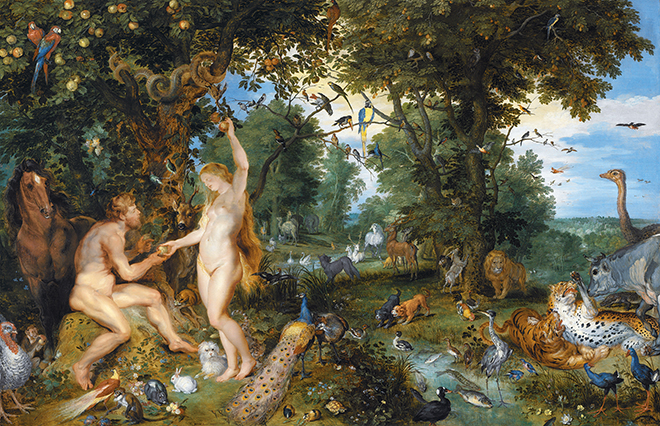According to the creation story of the Book of Genesis, humans were created when the earth with its vegetation and animals already existed. The ideas of a shared divine origin of humans and nature and humans as the “crown” of creation entitled to “rule over” and “use” their natural environment has determined attitudes ever since. On the negative side, the consequences range from the widespread human exploitation of animals, forests, and plants to the global pollution and climate change we face today. On the positive side, various ecological movements have emerged whose expressed goal it is to preserve the natural habitats of our planet. Jews, Christians, and Muslims have been instrumental in creating and participating in these movements not least because of their belief in the divine origin of the created world around us.
The conference will investigate various aspects of Jewish, Christian, and Muslim attitudes toward the natural environment from antiquity to today.
Digital event
The seminar will be held digitally because of the corona-virus.
If you wish to attend the conference, you can request a link to the Zoom-seminar from Professor Anne Katrine de Hemmer Gudme by sending an email to akgudme@teologi.uio.no no later than Monday 11 May.
You can download Zoom or use your browser: https://zoom.us/download
Programme:
Brief introduction, followed by papers:
- Welcome and introduction by Professor Catherine Hezser
-
Suggestions for further reading:
-
Roger S. Gottlieb, ed. The Oxford Handbook of Religion and Ecology (New York and Oxford: Oxford University Press, 2006).
-
Willis J. Jenkins et al., ed. Routledge Handbook of Religion and Ecology (London and New York: Routledge, 2017).
-
Hava Tirosh-Samuelson, ed., Judaism and Ecology: Created World and Revealed World (Cambridge, MA: Harvard University Press, 2002).
-
Martin D. Yaffe, ed. Judaism and Environmental Ethics: A Reader (Lanham: Lexington Books, 2001).
-
-
- 30 min: Christianity: David Horrell: Test cases for biblical hermeneutics and Christian ethics: slavery and the environment.
-
Suggestions for further reading:
-
Habel, Norman, An Inconvenient Text: Is a Green Reading of the Bible Possible? (Adelaide: Australian Theological Forum, 2009).
-
Harrill, J. Albert, "The Use of the New Testament in the American Slave Controversy: A Case History in the Hermeneutical Tension between Biblical Criticism and Christian Moral Debate", in Religion and American Culture: A Journal of Interpretation 10 (2000) 149-186.
-
Horrell, David G., The Bible and the Environment (London and New York: Routledge, 2014).
-
-
- 30 min. Islam: Thomas Hoffmann: The Nature of the Qurʾān: An Introduction to Nature and Ecology in the Qurʾānic Text.
- Suggestions for further reading:
- Anna M. Gade: Muslim Environmentalism: Religious and Social Foundations. A brand new monograph with textual and anthropological approaches to the subject.
- Thomas Hoffmann: ”Notes on Qur’anic Wilderness – and its absence”, in Laura Feldt (ed.), Wilderness in Mythology and Religion: Approaching Religious Spatialities, Cosmologies, and Ideas of Wild Nature (New York: De Gruyter, 2012).
- Not really ‘further reading’, but a Zoom seminar #4 with Sarra Tlili on “Ecology of Wonder” – a little bit of flipped learning. A Qurʾānic scholar presents her view on the Qurʾān’s visions of ecology, including a critique of the hypothesis of Qurʾānic anthropocentrism.
- Suggestions for further reading:
- 30 min: Judaism: David Seidenberg: Strange Bedfellows? Synthesizing a Robust Ecotheology from Maimonides and the Kabbalah.
- Suggestions for further reading
-
Kabbalah and Ecology: God's Image in the More-Than-Human World, David Seidenberg. Cambridge U Press, 2015. This book delves not only into Kabbalah but also rabbinic midrash, Maimonides, and modern and Hasidic thought, addressing the most difficult eco-theological problem in Judaism--the image of God--to demonstrate how an interpretation of Jewish thought that is coherent with ecology is possible.
The Ecology of Eden, Evan Eisenberg. New York: Knopf, 1998. This work deepens the perspective on what the ancient Hebrew were doing in remarkable ways.
-
“Judaism and Nature: Theological and Moral Issues to Consider While Renegotiating a Jewish Relationship to the Natural World”, Eilon Schwartz. In Judaism 44:4 (1985): 437–47. This article questions the dichotomy between Judaism and paganism and shows how presuming dichotomy yields a less accurate interpretation of Jewish and biblical thought and worldviews.
-
- Suggestions for further reading
Followed by another 30 min. of discussion and questions on all papers.
Moderator: Anne Katrine de Hemmer Gudme
